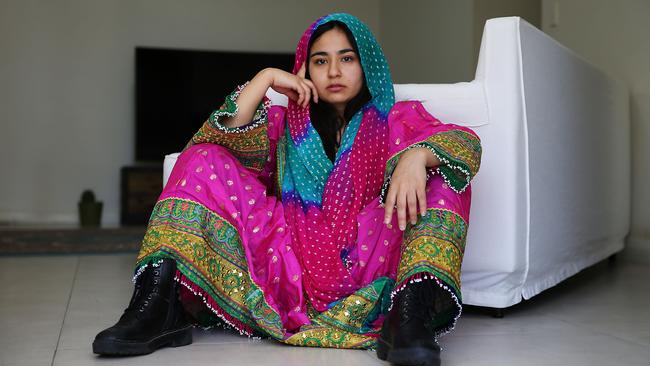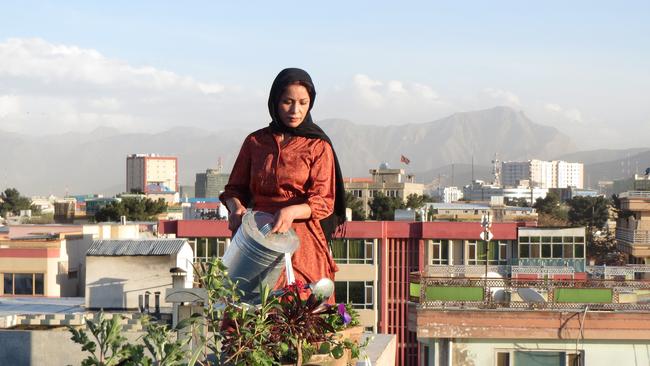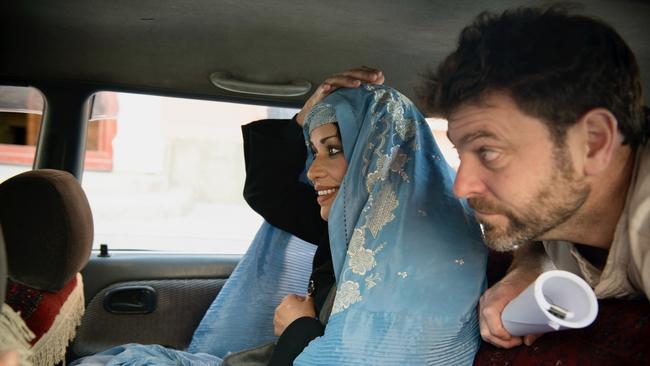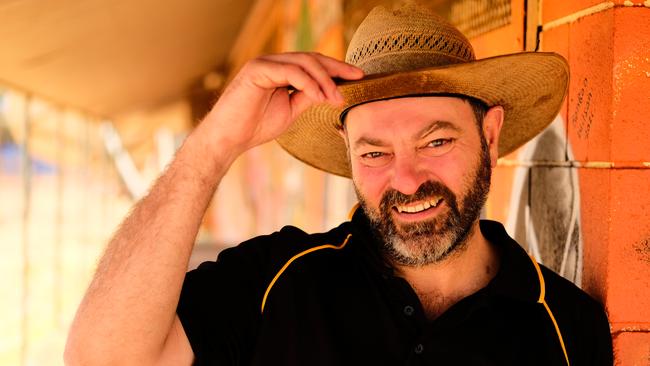Art crushed, we must now save Afghanistan’s creatives
The vibrant screen industry that flourished for 20 years in Afghanistan has died. Skilled employees have returned to a life of fear, hiding their work and identities.

“I don’t see anything in the future. I cannot say that I will call you tomorrow because the security situation is not clear. Everything is messed up.”
That’s a member of Afghanistan’s screen industry – let’s call him A – holed up somewhere in his country, weeks after the world watched in disbelief as Islamic fundamentalist group the Taliban seized the capital Kabul. Earlier this year, A had a job; he was part of a vibrant industry that had rebuilt itself during the American occupation of Afghanistan. Now it feels as though things have come full circle.
“Lots of newspapers, media, TV channels are shut down and they are under threat of the Taliban,” A says over a WhatsApp video call from an undisclosed location. “[The media workers] are frightened of the Taliban. They are jobless and now they are at home like us. I know if we continue our work [the Taliban] will kill us. We are afraid, so we hide our career, we hide ourselves.”
If the regime were to approach A on the street and start asking questions he already knows his response: “If they ask us ‘What are you doing?’ we introduce ourselves as a shopkeeper, a driver.”
During the Taliban’s rule of Afghanistan from 1996 to 2001, it destroyed cultural heritage sites and banned music and moving images under a strict interpretation of sharia law. Those who disobeyed were given public beatings. Musical instruments, television sets and recording devices were destroyed.
This time around, things are supposed to be different; in its first media conference after the takeover, the Taliban promised the international community that nobody would be harmed, that women’s rights would be protected within the framework of Islam and the press would remain free. Indeed, the group uses social media, radio and television to communicate.
Zabihullah Mujahid, the Taliban’s top spokesman, has reportedly said “we will define the status and position of music and art once the Islamic system is fully formed” and that “anything that has been banned in Islam will be treated based on Islamic teachings, and we will oppose them”.
Yet already there are reports of the Taliban painting over public artworks or murals on the streets of Kabul. In July the group took responsibility for the killing of Afghan comedian Nazar Mohammad, better known as Khasha Zwan, who it alleged was a member of the Afghan National Police and had been linked to the killing of its members.
Afghan folk singer Fawad Andarabi was in August reportedly shot in the head by the Taliban at his family property north of Kabul. And in October fighters identifying as Taliban reportedly killed three people for playing music at a wedding in eastern Nangarhar; the group confirmed the attack but condemned the gunmen and said they had been arrested.
Understandably, those in the arts and cultural industries are terrified. A has agreed to talk to Review on the condition of anonymity, along with his friend, whom we will call T. Between them they have more than 20 years’ experience in the Afghan screen industry.
“They don’t like cinema,” T says of the regime. “They think all the work we do is against the ideal of the Taliban. If they know what we were working as in the past they will punish us.”
And if they were to ask T what he does for employment?
“I will tell them I am a carpenter.”
The men tell how their colleagues immediately hid or posted hard drives of film footage overseas, wiping their computers in case their homes were raided by the regime. Already the scenes they see on free-to-air television are censored.
“There’s no drama (on television) at the moment (that shows women) without a scarf, a burka; there’s no advertisement that shows a woman,” says A.
There’s no Shereen.
Six years ago the pair worked on a hugely popular TV series, described by one newspaper as “Afghanistan’s daring, taboo-smashing feminist TV drama”.
The series Shereen was dangerous to shoot even back then in still conservative Afghanistan.
Today the filming of a story on the streets of Kabul about a woman whose husband dies fighting the Taliban would be utterly unthinkable. A and T wore Shereen as a badge of honour, now it’s their biggest secret.
But there is some hope. Australian director Max Walker, who created the TV pilot for Shereen, and his international filmmaking colleagues are fiercely working their contacts to help them evacuate.
***
Walker is a long way from Kabul. He’s working in the Australian desert, in the remote community of Yuendumu, 290km from Alice Springs, putting together a documentary about One Pound Jimmy (Gwoja Tjungurrayi), the first living Australian to feature on a postage stamp.

Every morning when he wakes up in the outback he finds a dozen messages on his phone from friends and colleagues in Afghanistan.
“It has been heartbreaking and incredibly frustrating,” the director, 50, tells Review.
“Some people have a passport, some don’t. Some have a passport but their families don’t. Some of them have tried to cross the border into Iran and have been caught and sent back. It’s incredibly tough to see the desperation and the fear.”
After the Taliban took Kabul, Walker and a group of fellow filmmakers –— people who had lived and worked in Kabul and are now sprinkled around the world — formed the Afghan Filmmakers Rescue Fund. From Coffs Harbour, on the NSW mid-north coast, they organised a lockdown movie night screening of the film Shereen (the pilot) and raised $12,000. To date they have raised more than $26,000 on crowd-funding site Chuffed to help filmmakers such as A and T and their families to safely evacuate, provide them with support, such as the paying of bills while they are in hiding, and to eventually resettle. On their books are 51 filmmakers, who they worked with on Shereen and other productions, which swells to more than 250 when families are included.
“We set up the page to help the people that we know,” Walker says. “If we went through a charity or NGO we genuinely didn’t know if the money would get to our guys.
“At the moment we are giving them a kind of stipend, we are sending enough to each of them every month so they don’t have to go out and put themselves in more danger. There are bills to pay and people to feed.”
The unfairness of it all, says Walker, is that while members of the screen industry such as A and T can no longer work in their country, they are highly employable, “they are incredibly intelligent, they are reliable, so capable at everything they do”.
Shereen came about when Walker, creative director of Australian production company Ironbark Media, was on one of his stints working in Afghanistan and was asked by media company Moby Group to mentor young filmmakers making narrative-style programs.
Moby Group was founded in 2002 by Australian entrepreneur Saad Mohseni, whose father was an Afghan diplomat, and became the largest media company in Afghanistan, owning dozens of assets including TOLO TV, which produced and broadcast Shereen.
Walker says they wanted him to make a series about women, a long-invisible cohort whose spending power was increasingly becoming recognised.
“Completely by coincidence these young single mothers I’d met through friends of mine had been telling me their story, in particular just how desperate they were to get a divorce or get away from their very controlling husband and go through the family court,” he says. “I started investigating that and that’s essentially how Shereen was born.”
Walker made the TV pilot, which is being made available for the first time as a stand-alone film to raise awareness, and placed the concept in the hands of the local team, including director Ghafar Azad, to produce the series. Their story about a 36-year-old single mother of three was a huge success. Leena Alam, who plays the titular heroine, was nominated for best actress at the 2016 Seoul International Drama Awards and Shereen was nominated for best mini-series drama.

Shereen’s predicament, as set out in the pilot, is immediately compelling. Born in northern Afghanistan in 1978, the girl attends the school where her father is principal. At 10 she loses her mother to a Soviet missile strike. At 14 she loses her father, who is killed for teaching girls.
By the age of 18 she is married with two sons. And after her husband dies fighting the Taliban she is forced to marry her brother-in-law. At 23 she is forced out of the home by her sister-wife and moves to her uncle’s home in Kabul with her three children. The battle isn’t over; Shereen’s controlling husband will do anything to destroy his wife’s career as a court stenographer.
“It was a story of this woman escaping from the village and the hard life she has with her children when they come to Kabul to make a new life,” says Alam, an Afghan-born actress whose family moved to the US when she was a teenager.
“It was something different about empowering a woman.”
Speaking to Review from her home in San Francisco, Alam says when she was a teenager people told her she should be a Bollywood actress because she had “a commercial face”. But on a trip back to Afghanistan from the US she became determined to be an “Afghan actress”.
When she visited Kabul during the Taliban rule she was overwhelmed to learn that a distant relative had smuggled in a tape of one of her films and hidden it out of fear it would be discovered and burned by the Taliban.
“I was like: now I want to be a serious actor,” says Alam. “I have my freedom and my family is allowing me. I’m going to use this to say what other woman want to say and they cannot say. That’s why I always chose the characters like Shereen.”
Alam moved back to Kabul in 2007 and worked in film for 11 years despite the lack of funding and dangerous conditions.
“There was always bombing. I can’t remember one film scene where we didn’t hear anything or we didn’t drive through the blood of people they were washing from the street. It became just normal to hear the bombings and wake up to explosive sounds.
“We continued even though we didn’t have a lot of funding. People would use their own money to make films for the love of the art and to make the cinemas grow because it had been banned for so long.”
Shereen’s daughter Nargis is played by Hasiba Ebrahimi, 24, who came to visit Sydney last year and remained due to the security situation in Afghanistan. After growing up in Iran and starring in the 2014 Iranian-Afghan romance, A Few Cubic Meters of Love, she moved back to Kabul to live with her mother and stepfather, who disapproved of her acting in Shereen.
“They were thinking it was too dangerous for me,” she says.
“It is not acceptable for a girl in society [to act]. I was fighting with my family [saying] ‘This is my job, this is my career, I want to do this. You can’t stop me.’ And they said ‘No, it’s not possible’.”
Ebrahimi did it anyway, being careful not to divulge too much information to her family on her whereabouts during the filming. Even when two grenades were thrown through the window of a house they had been filming at in Kabul, she kept quiet.

“Of course [my family were] going to stop me and say ‘No, you cannot continue’,” she says.
The producers needed female actors to work on the series and the filming had generated a lot of curiosity among local women, who would visit the set at night so as not to be seen.
Alam says one of the grenades had exploded before the crew arrived while the other, which had rolled under a generator, had not. While nobody can be sure exactly who threw the grenades, Alam was told they acted after a Mullah from the local mosque advised congregants that the subject matter of Shereen was harmful to society.
Ebrahimi says “people noticed that a lot of women come and go in the night-time and they were getting the wrong ideas about what we were doing and they decided one night to put a bomb in the house we had been working in. Thankfully no one was hurt. But it made us do the shooting faster because it was getting too dangerous for us.”
Every time an obstacle arose at home or on set, she reminded herself Shereen was “fighting in her own life with these kinds of problems; with men, with society, with the family, with freedom”. It slowly occurred to her that if the story could help her it may also be instructive to other women.
“My mum got better with me after Shereen,” she says. “When they released Shereen on TV people were watching it and my family started to get a little bit more relaxed with me.”
Looking back at Shereen and the success it enjoyed, Ebrahimi and Alam can’t help but be proud of what they achieved under the most difficult of circumstances.
“In the past 20 years artists did a lot [in Afghanistan] considering the political situation, the security situation and lack of funding,” Alam says.
“The world should know this, they should listen to these stories and know that now we have lost it all. The art is dead in Afghanistan but the one thing we can do is save the artists.”
For screenings of Shereen, visit FanForce at www.fanforcetv.com. All funds go to the Afghan Filmmakers Rescue Fund. To donate visit chuffed.org/project/afghan-filmmakers-rescue-fund


To join the conversation, please log in. Don't have an account? Register
Join the conversation, you are commenting as Logout